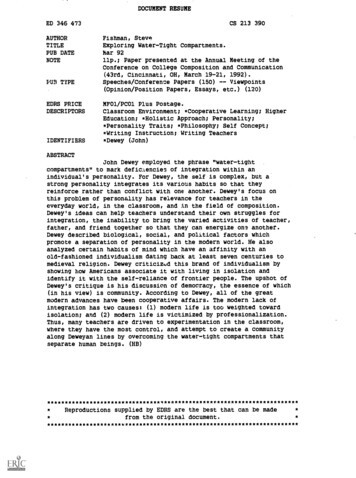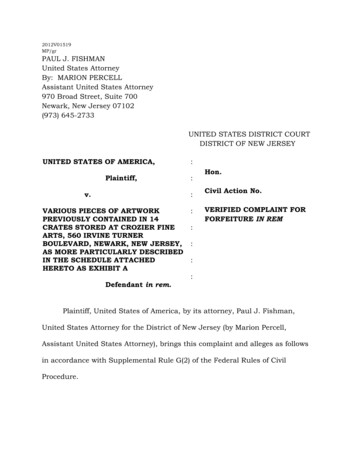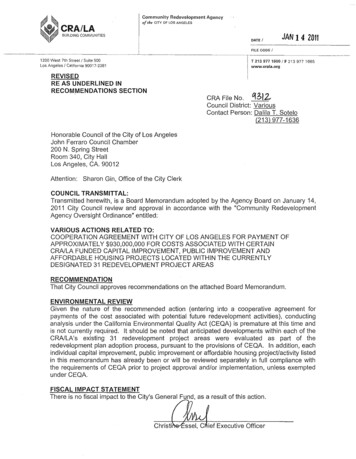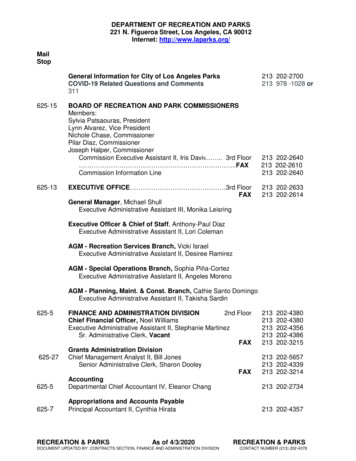
Transcription
DOCUMENT RESUMEED 346 473AUTHORTITLEPUB DATENOTEPUB TYPEEDRS PRICEDESCRIPTORSIDENTIFIERSCS 213 390Fishman, SteveExploring Water-Tight Compartments.Mar 92llp.; Paper presented at the Annual Meeting of theConference on College Composition and Communication(43rd, Cincinnati, OH, March 19-21, 1992).Speeches/Conference Papers (150) -- Viewpoints(Opinion/Position Papers, Essays, etc.) (120)MF01/PC01 Plus Postage.Classroom Environment; *Cooperative Learning; HigherEducation; *Holistic Approach; Personality;*Personality Traits; *Philosophy; Self Concept;*Writing Instruction; Writing Teachers*Dewey (John)ABSTRACTJohn Dewey employed the phrase "water-tightcompartments" to mark deficlencies of integration within anindividual's personality. For Dewey, the self is complex, but astrong personality integrates its various habits so that theyreinforce rather than conflict with one another. Dewey's focus onthis problem of personality has relevance for teachers in theeveryday world, in the classroom, and in the field of composition.Dewey's ideas can help teachers understand their own struggles forintegration, the inability to bring the varied activities of teacher,father, and friend together so that they can energize ona another.Dewey described biological, social, and political factors whichpromote a separation of personality in the modern world. He alsoanalyzed certain habits of mind which have an affinity with anold-fashioned individualism dating back at least seven centuries tomedieval religion. Dewey criticized this brand of individualism byshowing how Americans associate it with living in isolation andidentify it with the self-reliance of frontier people. The upshot ofDewey's critique is his discussion of democracy, the essence of which(in his view) is community. According to Dewey, all of the greatmodern advances have been cooperative affairs. The modern lack ofintegration has two causes: (1) modern life is too weighted towardisolation; and (2) modern life is victimized by professionalization.Thus, many teachers are driven to experimentation in the classroom,where they have the most control, and attempt to create a communityalong Deweyan lines by overcoming the water-tight compartments thatseparate human beings. *************************Reproductions supplied by EDRS are the best that can be madefrom the original ******************************
U.S. DEPARTMENTOF EDUCATIONOnce ot EducationalResearch and ImprovementE UCATIONAL RESOURCESINFORMATION"PERMISSION TO REPRODUCE THISreproduction qualitVILO%been made to improvePoints Owe* or opinions Mated in this dOcument do not necessarily represent ()momOFRI position or policy1MAT RIM. HAS BEEN GRANTED BYaNTER (ERIC)This document has been reproduced asreceived from the person or organizationoriginating it0 Minor changes haveTO THE EDUCATIONAL RESOURCESINFORMATION CENTER (ERIC)."Steve FisimanPhilosophy Dept.UNC-charlotteCCCC Talk, 1992EXPLORING WATER-TIGHT COMPARTMENTSBy employing the phrase "water-tight compartments", John Deweywalks in the footprints of an eighteenth century romantic tradition.Johann Gottried Herder, a century and half earlier, had used thephrase to criticize faculty psychologies, like Immanuel Kant's,which divided reason from sense, intellect from imagination, soulfrom mind (see Patrick Gardner, Nineteenth Century Philosophy, NewYork: The Free Press, 1969, p.6). Dewey, in ways similar to Herder,uses water-tight compartments to mark deficiencies of integrationwichin an individual's personality.I have found three instances ofthe phrase in Dewey's writings.In Human Nature and Conduct, published in 1922, Dewey discussesthe failure to allow our various impulses and habits to inform oneanother.There is no one ready-made self behind activities.There arecomplex, unstable, opposing attitudes, habits, impulses which graduallycome to terms with one another.Eeven if] only by means of a distributionof inconsistencies which keeps them in water-tight compartmeats, givingthem separate turns or tricks in action(Human Nature & Conduct, p.138).For Dewey, the self is complex and shifting, but a strongpersonality integrates its various habits so they re-inforce ratherthan ignore or conflict with one another.Dewey's next use of the phrase water-tight compartments occursin The Public & Its Problems which appeared five years later in1927.A man may be one thing as a church member and another thingas a member of the business community.The difference may be carriedas if in vater-tight compartments, or it may become such a division asto entail internal conflict(The Public & Its Problems, p.191).Dewey tells us that when our roles as business man, church member,and parent are kept apart, we miss an important opportunity to2BEST COPY AVAILABLE
42relate different aspects of our lives, to see ways in which churchmembership might effect our parenting, ways in which parenting mighteff4ct the conduct of our business.The final reference I have found is from Experience andEducation, published nearly a decade later in 1936.Almost everyone has had occasion to look back upon his schooldays and wonder what has become of the knowledge he was supposedto have amassed during his years of schooling.One trouble is thatthe subject-matter in question was learned in isolation; it was put, as itwere, in a water-tight compartment(Experience & Education, p.48).Dewey explains why we are able to master lots of materials to passschool exams but later on have trouble recalling them. Dewey'sexplanation is that we have stored this information in inaccessiblecompartments because we were discouraged from relating thesematerials to our broader, non-school interests.In each of these uses of the phrase water-tight compartmentsDewey refers to problems of personality-- failures to integratehabits or functions or pieces of information. But the idea ofwater-tight compartments is more fundamental to Dewey's thought thanthis focus on problems of personality suggests. His extensivewritings about democratic society, education, and loss of communityreflect his attention to similar problems of integration at theDewey is concernedsocial rather than just the individual level.with integration for groups as well as persons.WATER-TIGHT COMPARMENTS AND MY PERSONAL STRUGGLESWhy am I focussing on something as apparently esoteric asI do so becauseDewey's use of the phrase water-tight compartments?of its relevance to my own struggles in three areas-- in theeveryday world, in the classroom, in the field of rhetoric andcomposition.First, on the personal level I struggle to figure out why I amdivided, unable to bring an integrated self to my roles as father,son, husband, friend, and colleague.Many of my roles conspireagainst the shared responsibility or equivalence which successfulrelationships require.My mother wants to keep me a babe; my son3
134designates me a hero; my students demand an omniscent oracle.Inaddition, my own habits promote isolation, betraying my inability torelate to others.Sociologist Philip Slater helps me understandthat by having my own TV, my own car, my own phone, and my owncountry retreat,I minimize the time I must spend negotiating withothers about things we have in common (The Pursuit of Loneliness).Like many Americans, according to Slater, I try to avoid peoplesince I cannot relate to them.Second, as a teacher I struggle to create a community in myphilosophy classroom, to break down the compartments that separatestudents from me and from each other as well as the compartmentsthat isolate students' personal concerns from my course'sIn this regard, Dewey's discussions of community,philosophic ones.communication, and equality are helpful in building the classroom Idesire, a classroom attempting to integrate students' acadeAic andeveryday lives, reduce the separation of teachers as experts from(For Dewey's discussion aboutstudents as naive empty vessels.student "ownership" of school materials, see Democracy & Education,pp.154-188).Third, in the field of rhetoric and composition I struggle tounderstand the best way to teach writing. Year after year I followversions of the current debate between David Bartholomae and PeterShould I teach writing skills which can be applied in allElbow.writing situations or should I teach the idiosyncracies ofphilosophic discourse? In this connection, Dewey's work is alsorelevant.My reading is that Dewey would side with those whohighlight writing of the sort Peter Elbow calls "personal" writing,the sort which would allow different disciplinary majors to talkwith one another and develop more meaningful community.These are my reasons for discussing Dewey's use of the phrasewater-tight compartments. In what follows I will not directlyaddress issues of education or rhetoric and composition. Rather, Iwill fucus primarily on ways Dewey helps me understand my ownstruggle for integration, in short, to understand the unintegratedquality of my life, my inability to bring my activities as teacher,researcher, father, and friend together so they energize oneanother, so my different selves can approve and support one another.
449I now turn to specifics in Dewey's work which speak to the sourcesof my dilemma.WHAT LEADS TO WATER-TIGHT COMPARTMENTS?Biological, Social, and Political FactorsAt the outset let me mention a few biological, social, andpolitical factors whi h, according to Dewey, promote separation.For example, Dewey sees in our biology a tendency to separate, adisposition to isolate, to be so proud of our distinctions that webuild protective moats around ourselves (Experience and Natul-e,p.331).Dewey also cites social causes of separation, in particular, ourculture's increasing reliance on specialization. From Dewey's pointof view, specialization, despite its short-term efficiency, tends tocompartmentalize people by making it more difficult to have commonexperiences, to step into one another's shoes. Specialization alsoweakens character by encouraging inconsistency, by forcing ourhabits to alternate with one another rather than reinforce oneanother (Human Nature and Conduct, pp.38-39).In addition, separation is promoted by political factors,especially the complexity and size of modern nation states.Underlying much of Dewey's thought is a concern for face-to-facerelationships. Dewey argues that recovery of community depends uponrevitalized small, local groups because such intimate groups canprovide the stability and attachment which happiness requires."Democracy," writes Dewey, "must begin at home, and its home is theneighborly community" (The Public & Its Problems, p.213). Althoughface-to-face, small-town relationships are not utopias, theirstability at times sliding intr, stagnation, it is clear we live in asociety in which it is easier to satisfy our need for separationThis is true, for Dewey,than to satisfy our need for communion.because the social and political actions whose consequences impingeupon us are so remote and complex, we are unable to locate otherswho are equally affected and with whom we might find common purpose.As an example, Dewey cites farmers who, during the inflationary
54period of World War I, bought land and machinery on credit but wentbankrupt after the war because of lower food prices.According toDewdy, these farmers could not foresee the consequences of the worldevents affecting their businesses, nor could they clearly identifythose similarly affected and with whom they might have joined forcesDewey'sto prevent ruin (The Public & Its Problems, p.129).solution to the problems of the complex nation state calls forgreater application of scientific method to social inquiry andgreater dissemination of the results of such inquiry.THE ASSUMPTIONS OF OLD-FASHIONED INDrVIDUALISMAlthough these biological, social, and political facts to whichDewey directs our attention are important, what helps me moreclearly understand my own struggle for integration is Dewey'sanalysis of certain habits of mind, habits which Dewey might callIn fact, thesethe exhortations of old-fashioned individualism.habits are so dominating and pervasive in my life that I shudder atthe energy and insight I need to alter them. What are these habitsof mind and how do they keep me from an integrated life?From all corners of my middle-class world I hear imperatives tocompete for myself, get A's, find a good job, rise to the top andexperience the personal happiness, respect, and glory which follow.In fact, I recognize the same marching orders in the eyes of mystudents.They want the best grades in order to get the best jobsso they can earn a lot of money or the equivalent in personal honorand prestige. Like Spinoza who tried materialism and found itwanting, my own taste of the fruits of individual triumph suggeststhat they too are wanting. What has gone wrong? Perhaps I have notcompeted hard enough or earned large enough rewards or fought on theBut I suspect that to competeright battle fields. Perhapsharder would only put me in the position of a drug-addict pursuinglarger and larger fixes for my habit. What Dewey does for me is topresent an alternative way to conduct my life and to suggest that mycurrent way of going at the world is not inevitable. Dewey shows methat the exhortat4ons for personal success which put me in awater-tight compai ment, isolating me, leading me to disconnect
Pt61personal and communal interests, are particular responses toparticular economic aid political problems and not ineluctablefeatures of the human condition.What are the sources of these exhortations and how do theyisolate me?Dewey believ;Js that the root of old-fashionedindividualism goe0 back at least seven centuries.(For Dewey'sdiscussion of the history of individualism, see The Public & ItsProblems, especially ch.III, and Individualism, Old & New, chapterV.)He suggests that the spiritual source of individualism is foundin medieval religion with its emphasis on the soul and on ourseparate, personal salvations.The industrial revolution, accordingto Dewey, gave a secular turn to individualism but continued theidea, through its emphasis on private property, that rewards areinstrinsically personal (Individualism, Old & New, p.75).Thecentral figure in Dewey's account of individualism's secular turn isJohn Locke.Locke claims that each of us has a right to life,liberty, and property, and that each of us, on our own, candetermine how to act in our own best interests. Further, accordingto Dewey, Locke's idea of individual rights joined forces with thelaissez-faire doctrine of economics to justify all-out competitionin the market place.Despite the absence of any deliberate socialor economic planning, an "invisible hand of Providence" would insurethat the best goods would be produced at the cheapest prices, and,as a result, all competitors would receive their just deserts andthe entire commonwealth would prosper.Dewey completes his account by suggesting that these economicand political doctrines were reinforced by the psychologies of Lockeand Descartes.In,both psychologies, mind was presented apart fromEach of us, in isolation and confronting experienceindependently, could arrive at truth. Although Locke thought thecontext.building blocks of truth were sensible impressions whereas Descartesthought they were ideas perceived "clearly and distinctly," both menthought minds could work autonomously and transcend personalcircumstances.In these religious, political, economic, andpsychological theories we have the roots of the water-tightcompartments which, in the late twentieth century, keep my variousroles unconnected and keep my isolated from others.
7DEWEY'S CRITIQUE OF OLD-FASHIONED INDIVIDUALISM AND LAISSEZ-FAIREEC0140MICSDewey begins his evaluation of old-fashioned individualism bycriticizing its foundations. From his point of view the problemwith the doctrine of individual rights is that its proponents failedto recognize the particular historical context in which it wasfashioned.With the rise of merchant and manufacturing classes,individual rights were a means of loosening the mercantilerestrictions standing in the way of fluid capital, labor, and trade.Generalizing from their attack on feudal institutions, reformerslike James Mill and Jeremy Bentham saw liberty as freedom from allinstitutional restraints. They failed to honor the cohesive forces,the stable objects of community allegience which enabled liberals tocollectively demand their individual rights.Old-fashionedindividualism made it seem as if people could exist in isolation,that the battle was between individuals and society, betweenTo the contrary,personal impulses and collective constraints.Dewey argues that people are always in associative behavior withothers and that it is never a choice of going one's own way orjoining the crowd. The choice, according to Dewey, is always aboutwhich associations to join and the effect of these associations uponour personal potentials.Individuals find themselves cramped and depressed by absorption oftheir potentialities in some mode of association which has beeninstitutionalized and become dominant.They may think they are clamoringfor a purely personal liberty, but what they are doing is to bring intobeing a greater liberty to share in other associations.Life has beenimpoverished, not by a predominance of 'society' in general overindividuality, but by a domination of one form of association, the family,Clan, church, economic institutions, over other actual and possible forms(Public & :ts Problem, pp. 193-194).People mistake their desire for more fulfilling associations with adesire for fn.km from all associations.This, according to Dewey,is especially true of contemporary American society which identifiesindividualism with the self-reliance of frontier people.But this,
84for Dewey, is doubly misleading. Although pioneers dramaticallyexhibited self-reliance, their individual work took place in thecontext of communal religious, political, and social experiences.Second, although today's business and political leaders speak aboutthe value of private initiative, we, in fact, live in a world whichis anything but private. For example, although Henry Ford isconsidered the founder of the automobile industry, Henry Ford didnot invent the automobile industry by himself. It was the result ofthe work of generations of laborers and technicians. Henry Fordsimply appropriated these collective efforts for his private purposeAlthough we still talk to ourselves in terms of personalreward and initiative, the reality o modern life is that all ourFailure to bring ouractions are tied to the actions of others.and gain.ideas of initiative into harmony with actual practice leads, inDewey's terms, to an individual "divided within himself"(Individualism, Old & New, p.50).Just as Dewey is critical of the idea that individuals achievesuccess by independently pursuing their own interests, so he iscritical of the view that freedom of thought is a matter ofself-reflection, a state of mind which can be achieved in isolation.To the contrary, for Dewey, isolated individuals off by themselvesmay engage in fantasy but not free thinking. For Dewey, freedom ofthought means acting on one's ideas and disseminating them.Itmeans criticism and testing, using thought to modify the environmentand challenge the behavior of others.The upshot of Dewey's outline and criticism of our notions ofindividualism are encapsulated in his discussion of democracy, andDewey's discussion'of democracy offers me further insight into mystruggle to lead an integrated life. The popular notion ofdemocracy, my idea of democracy, is that it means giving people thefreedom to do as they please until it directly impinges upon my ownfreedom.You do your thing and leave me alone to do mine.Government exists to make sure no one steps on another's toes.Thebest government is the one which governs least. What is somarvelous for me about Dewey's view of democracy is that he turns myown view upside down.Whereas I have always thought of democracy asopen competition in which the hardest workers get the best, personal
T.9rewards, Dewey tells me the essence of democracy is community, andcommunity means striving for a shared goal simply because it isshared; it means like mindedness, having common aims, knowledge,beliefs, and aspirations (Democracy and Education, p.4).Wherever there is conjoint activity whose consequences areappreciated as good by all singular persons who take part in it, and wherethe realization of the good is such as to effect an energetic desire andeffort to sustain it in being just because it is a good shared by all,there is in so far a community (The Public & Its Problems, p.149).Whereas my entire life program has been an effort to find personalsatisfaction by reducing my dependence upon others, Dewey calls theidea of being able to stand and act alone "an unnamed form ofinsanity" (Democracy and Education, p.44). According to Dewey, allof the great modern advances-- in science, art, and education-- havebeen cooperative affairs. It is just that the fruits of theseadvances have been appropriated by a few for their private gain.To conclude, I believe Dewey would say the causes of my lack ofintegration are two-fold. First, my approach to life is tooweighted toward isolation, toward view4 g my own happiness asindependent of the happiness of others. Instead of seeing libertyas a chance to be free of all interference, Dewey would want me tosee liberty as the chance to join in common cause, to adjust to andrespect the unique contributions each member can make to a grouppurpose.Instead of dwelling on the joys of standing apart fromothers, Dewey would say it is time for me to emphasize the joys ofworking harmoniously in a group, building a common language,switching roles so I can share others' experiences.Second, Dewey might say that I have been victimized by theI think of my relationships toconsequences of professionalism.doctors and car mechanics and even to my department chair whocouldp't care less about Dewey.In each of these relationshipsthere is little common purpose, common language, or sharedexperience.Because so many of my relationships do not lead tocommunity-- do not have the common aims, beliefs, and aspirationswhich are Dewey's conditions of community-- I despair and retreatfrom them.As a result, and perhaps because I have more control over myI()
104philosophy courses than other aspects of my life,I have been drivento experiment with my classroom, to turn it toward community bytrying out Deweyan principles.For example, in order to horeIrstudent differences, to promote the interpenetration of differentstudent lives, I make a place for student stories alongside theclassroom texts.In order to share more responsibility withstudents and to promote common experiences, I encourageI become apprentice by doing the course asaignmentsrole-switching.along with my students, and I allow students to become teachers byletting them set the tone and agendas for class discussion. And,finally, to encourage integration of academic and non-school worlds,I push my students to write philosophic papers which focus on theirown lives, on those issues which refuse to go away, which stamptheir feet at the tips of their noses demanding attention. In sum,in my classroom I'work to puncture the water-tight compartmentswhich keep me from my students, which isolate my students from eachother, and which separate philosophic discourse from everydaylanguage.11
AUTHOR Fishman, Steve TITLE Exploring Water-Tight Compartments. PUB DATE Mar 92 NOTE llp.; Paper presented at the Annual Meeting of the. Conference on College Composition and Communication (43rd, Cincinnati, OH, March 19-21, 1992). PUB TYPE Speeches/Conference Papers (150) -- Viewpoints (Opinion/Position Papers, Essays, etc.) (120)










